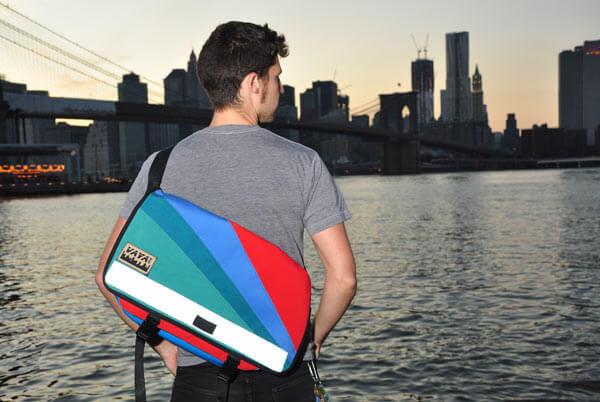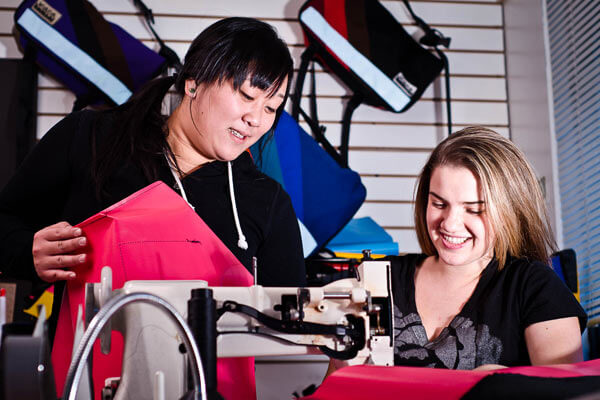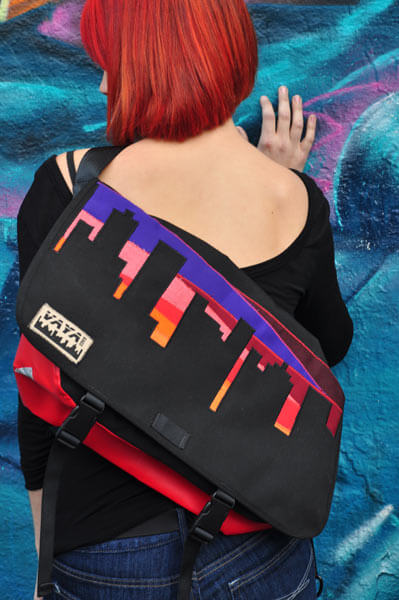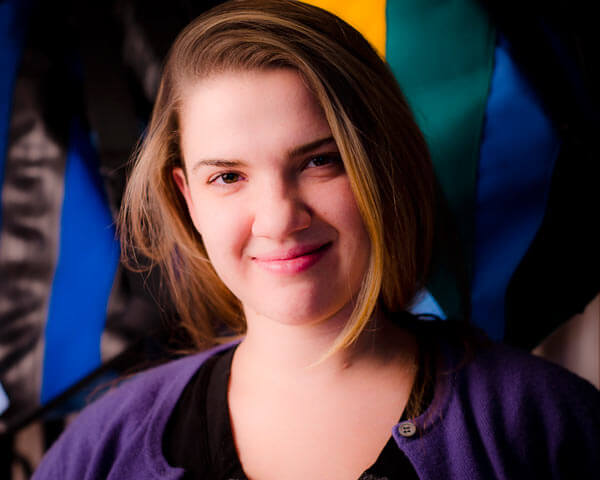By Tammy Scileppi
At a time when small businesses aren’t thriving, a young store owner, who lives in Ridgewood with her husband and three cats, bravely maintains her “I think I can” attitude.
In the workshop of her small Ridgewood storefront, at 70-08 60th St., which opened in March 2010, Tianna Meilinger teams up with her staff of two good friends, Grace Kim and Angie Boylan, to craft hip, one-of-a-kind messenger bags out of, well, garbage. Actually, from recycled materials, like sailboat canvas scraps and old bicycle tubing, combined with rugged industrial textiles. The result is a stylish custom bag designed to withstand everyday abuse.
“The great part about Vaya Bags is that they are all individually handmade — making them all unique.” They’ve become popular with teens, college kids and bike messengers; even office execs and moms, who can use them as diaper bags.
A cycling enthusiast and Boston University environmental science major, Meilinger first thought, “Oh, I’ll make bags until I find a real job in my field,” but she just kept making them, and soon it became her occupation. A hobby morphed into a small business, and her fierce drive and moxie finally paid off.
Thinking out-of-the-box, the designer made her first messenger bag in 2005, while studying and working in Boston. It was her “Aha!” moment: “I was riding my bike to and from school and work, and desperately needed a sturdy, functional bag; instead of buying one, I decided to make myself one.”
Nowadays, the messenger bag is her best seller because of its versatility and colorful graphics. It comes in varying sizes and boasts special features designed for biking, such as reflective tape and a padded stabilizer strap, making it perfect for commuting or grocery shopping by bike. “Since the bags are completely waterproof, you can carry your laptop, papers and whatever else, and not worry about getting caught in the rain; everything stays dry,” said Meilinger.
The complete line of “upcycled” products also includes laptop bags, purses, wallets, backpacks, bike accessories and more.
The story behind Vaya Bags
At 15, Meilinger learned how to sew from her dad, who is a leather craftsman. After college she moved back home to Long Island in 2006 and had her workshop out in the garage. “I started making bags, then selling them to friends, at craft shows and online. That’s how Vaya Bags was born.”
Aptly named, vaya means “go” in Spanish: “I wanted something with a Latin flare to it and thought it was a good name for my business, since the bags are made for people on the go.”
“I always had a good eye for making things, but I never really intended to go into the bag-making business,” said Meilinger, who grew up with an appreciation for handmade goods and understood how to use other people’s garbage to make art.
So she found a sailboat awning manufacturer who agreed to give her any scraps he would throw out from his factory. And the old bike tubes? She gets those from local bike shops in Queens, Brooklyn and on Long Island: “They agreed to throw them in a box for me, instead of discarding them.”
With no business model or experience, Meilinger said it was her dad who had given her an in-depth look at what it’s like to run a small business. “My family is extremely supportive of me making a living out of my art,” she said, “and trying to make a business out of doing something I love.”
A green philosophy
The environmentally conscious designer noted that about 75 percent of the materials she uses for her bags are recycled; she just buys the hardware, Velcro, and few other materials.
“I’m really passionate about keeping our environment clean and healthy. At the store, we try not to throw anything out, so even scraps used to make our bags are swept up and transformed into small pouches and wallets.”
Is it any wonder then that Meilinger gets inspiration for her designs from the environment and nature? “I do a lot of custom bags with leaves, trees, mountains and cityscapes on them.”
“We’re proud to say our bags are 100 percent handmade in the U.S.A., and I love the fact that I’m personally involved in the production of each product. The customer knows that a lot of love and care went into the making of each item,” Meilinger said.
She also noted that there’s a lot of pressure and stress with owning your own business, but she likes the freedom that it brings.
Vaya Bags will be starring in an upcoming feature film this summer, called “Premium Rush” — many cast members will be wearing them.
Meilinger’s bags are on display at the Queens Museum of Art gift shop, where she is one of their “Made in Queens” artists.
Find her bags for sale at vayabags.com or etsy.com/shop/vayabags.




































